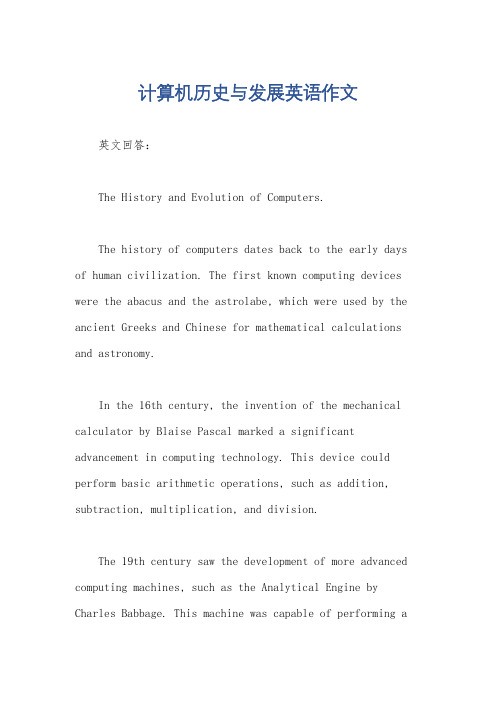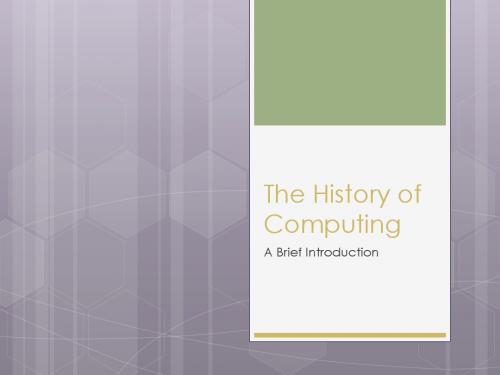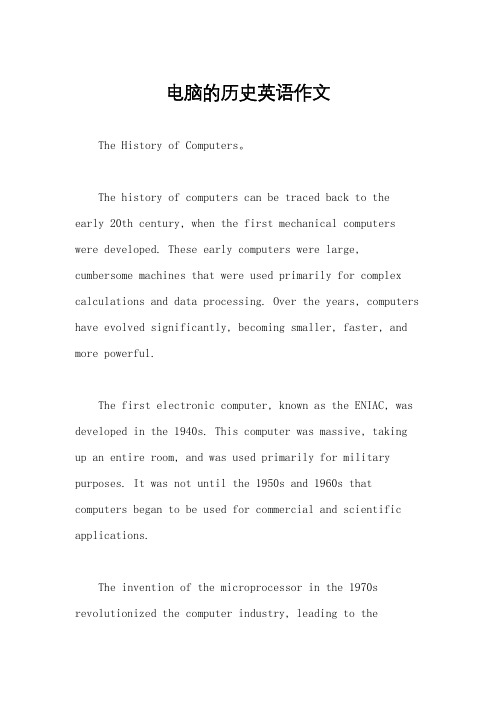英语课间展示History of computer
计算机历史与发展英语作文

计算机历史与发展英语作文英文回答:The History and Evolution of Computers.The history of computers dates back to the early days of human civilization. The first known computing devices were the abacus and the astrolabe, which were used by the ancient Greeks and Chinese for mathematical calculations and astronomy.In the 16th century, the invention of the mechanical calculator by Blaise Pascal marked a significant advancement in computing technology. This device could perform basic arithmetic operations, such as addition, subtraction, multiplication, and division.The 19th century saw the development of more advanced computing machines, such as the Analytical Engine by Charles Babbage. This machine was capable of performing awide range of mathematical operations and is considered to be the first mechanical computer.In the 20th century, the invention of the electronic computer revolutionized the field of computing. The first electronic computer, the ENIAC (Electronic Numerical Integrator and Computer), was developed by John Atanasoff and Clifford Berry at the University of Pennsylvania in 1943.The ENIAC was a massive machine that weighed over 30 tons and contained over 18,000 vacuum tubes. It was capable of performing complex calculations at a speed of 5,000 operations per second.The development of transistors in the late 1940s and early 1950s led to the creation of smaller and more powerful computers. The first transistorized computer, the TX-0, was developed by MIT in 1956.The 1960s and 1970s saw the development of integrated circuits (ICs), which allowed multiple transistors to bepacked onto a single silicon chip. This advancement led to the creation of even smaller and more powerful computers.The 1980s saw the release of the first personal computers (PCs), which brought computing power toindividual users for the first time. The IBM PC, releasedin 1981, was a particularly influential model that popularized the PC concept.The 1990s and early 2000s saw the development of the World Wide Web and the Internet, which connected computers around the world and revolutionized the way people communicated and accessed information.The 21st century has seen the rise of mobile computing, cloud computing, and artificial intelligence (AI). Mobile devices, such as smartphones and tablets, have become ubiquitous, providing users with access to computing power and connectivity on the go.Cloud computing allows users to access and store data and applications over the Internet, rather than on theirown devices. This provides greater flexibility and scalability.AI is a field of computer science that focuses on developing intelligent systems that can perform tasks typically requiring human intelligence, such as learning, problem-solving, and decision-making.The development of computers has had a profound impact on society. Computers have revolutionized the way we work, communicate, learn, and access information. They have also played a major role in scientific research, engineering, medicine, and many other fields.As computing technology continues to evolve, it is likely to have an even greater impact on our lives in the years to come.中文回答:计算机的历史与发展。
电脑发展英语作文

电脑发展英语作文The Development of Computers。
The development of computers has had a profound impact on our lives in recent decades. From the early days ofroom-sized mainframes to today's sleek and powerful laptops, computers have become an indispensable part of our daily lives. In this essay, we will explore the history of computer development, its impact on society, and its future potential.The history of computer development can be traced backto the mid-20th century. The first electronic digital computer, ENIAC, was built in 1946 and took up an entire room. Over the years, computers have become smaller, faster, and more powerful. The invention of the microprocessor in the 1970s paved the way for the development of personal computers, which revolutionized the way we work, communicate, and entertain ourselves.The impact of computers on society has been tremendous. In the workplace, computers have automated many tasks, increasing efficiency and productivity. In the field of education, computers have transformed the way we learn, with online courses and digital textbooks becoming increasingly popular. In the realm of entertainment, computers have given rise to video games, virtual reality, and streaming services, providing endless hours of enjoyment for millions of people.Looking to the future, the potential of computers seems limitless. With the advent of artificial intelligence and machine learning, computers are becoming increasingly adept at performing complex tasks that were once thought to be the exclusive domain of humans. From self-driving cars to medical diagnostics, the possibilities for computer technology are endless.However, the development of computers also raises important ethical and social questions. As computers become more powerful and pervasive, concerns about privacy, security, and job displacement have become increasinglyprominent. It is crucial that we address these issues and ensure that the benefits of computer technology are shared equitably and responsibly.In conclusion, the development of computers has had a profound impact on our lives, and its potential for the future is immense. As we continue to harness the power of computer technology, we must also be mindful of itspotential pitfalls and work to ensure that it benefits all members of society. By doing so, we can ensure that the future of computer technology is bright and full of promise.。
History of Computers, Computer Graphics and Virtual Reality

(1967) • Bell Labs: UNIX (1970) • Floppy disks (1970) • Intel 4004- computer on a chip (1971)
History of Computers, Compulity
Brief History of Computers
• Abacus, adding machine with gears (Pascal-17th c), Leibniz (early 18th c), Jacquard (loom, early 19th c)
Brief History of computers (con’t)
• IBM 650 – first mass produced computer – 500K RAM (1953) • Texas Instruments- silicon transistors (1954) • McCarthy and Minsky AI (1956) • DEC PDP- first minicomputer - monitor and screen (1960) • First video game (1962) • ARPANET (adv res proj agency – 1962) • Engelbart’s mouse (1964) • Integrated circuits (chips) in computers - Burroughs(1968)-
• Babbage’s Difference Engine and Analytical Engine (programmable- 19th c), Ada Lovelace
英语介绍电脑发展史

The ULSITFra biblioteke PCThe smallest CMOS chip(芯 片) in the world . It is 0.4
mm level.
Maybe computer’s invention is for the war, but with the development of society. I believe that the purpose of computer-generated is to make people to create more material wealth, and make the potential of people even greater development.
Thank you !
英语介绍电脑发展史
The first generation of tube
computer(1945-1956)
In February 15,1946,marking the birth of the modern computer ENIAC is invented in the Philadelphia (费城). The ENIAC represents the history of the computer milepost(里程碑).It is developed by the United states government and the university of Pennsylvania, used 18000 vacuum tubes(真空管),70000 resistors(电阻器),5 million welding point(焊接点),and the power consumption about 160 kilowatts. The operation speed is about 5000 times a second .it is very quick at that age .
电脑的历史 英语作文

电脑的历史英语作文Title: A Journey Through the History of Computers。
Introduction。
The history of computers is a fascinating journey through innovation, ingenuity, and technological advancement. From humble beginnings to the sophisticated devices we rely on today, the evolution of computers has revolutionized nearly every aspect of human life. In this essay, we will delve into key milestones and breakthroughs that have shaped the computer landscape.Early Beginnings。
The roots of computing can be traced back to ancient civilizations, where devices like the abacus were used for basic arithmetic calculations. However, it was not until the 19th century that the concept of a programmable machine began to take shape. Charles Babbage, often regarded as the"father of the computer," designed the Analytical Engine in the 1830s, a mechanical device capable of performing various calculations through the use of punched cards.The Advent of Digital Computers。
History of computer development计算机发展史ppt

Babbage's Difference engine巴贝奇差分机
First general-purpose computing device The Engine incorporated an arithmetic logic unit, control flow in the form of conditional branching and loops, and integrated memory, making it the first design for a general-purpose computer that could be described in modern terms as Turing-complete
The addend and subtrahend machine
In 1668, Samuel Morland who was English ,invented the addend and subtrahend machine. Sir Samuel Morland , of England, produces a non decimal adding machine, suitable for use with English money. Instead of a carry mechanism, it registers carries on auxiliary dials, from which the user must re-enter them as addends.
The future development trend of computer
The development of computer technology has the following four characteristics : 1. multi-polarization(多极化) 2. Intelligent(智能化)
The History of Computing

Concept
of the stored program
Charles Babbage
Invents Difference Engine in 1823
Adds, subtracts, multiplies, and divides Components of modern computer
The History of Computing
A Brief Introduction
Why You Need to Know About…the History of Computing
Fields altered by computer communication devices
The Computer Era Begins: The First Generation
1950s: First Generation for hardware and software
Software separates from hardware and evolves
Circuit Boards in the Third Generation
Integrated
circuits (IC) on chips
Miniaturized circuit components on board Semiconductor properties Reduce cost and size Improve reliability and speed Program to manage jobs Utilize system resources Allow multiple users
电脑的历史英语作文

电脑的历史英语作文The History of Computers。
The history of computers can be traced back to the early 20th century, when the first mechanical computers were developed. These early computers were large, cumbersome machines that were used primarily for complex calculations and data processing. Over the years, computers have evolved significantly, becoming smaller, faster, and more powerful.The first electronic computer, known as the ENIAC, was developed in the 1940s. This computer was massive, taking up an entire room, and was used primarily for military purposes. It was not until the 1950s and 1960s that computers began to be used for commercial and scientific applications.The invention of the microprocessor in the 1970s revolutionized the computer industry, leading to thedevelopment of personal computers. These early personal computers were still quite large and expensive, but they marked the beginning of a new era in computing.In the 1980s and 1990s, personal computers became more affordable and accessible to the general public. This ledto a boom in the computer industry, with many companies competing to produce faster, more powerful computers. The development of the internet further revolutionized the computer industry, allowing people to connect and communicate in ways that were previously unimaginable.Today, computers are an essential part of everyday life. They are used for everything from communication and entertainment to business and education. The development of smartphones and tablets has further expanded the role of computers in our lives, allowing us to stay connected and productive no matter where we are.Looking to the future, it is clear that computers will continue to play a vital role in our society. As technology continues to advance, computers will become even morepowerful and versatile, opening up new possibilities for how we live, work, and communicate.In conclusion, the history of computers is a story of innovation and progress. From the early mechanical computers to the powerful devices we use today, computers have come a long way. As we look to the future, it is exciting to think about the possibilities that lie ahead for this incredible technology.。
- 1、下载文档前请自行甄别文档内容的完整性,平台不提供额外的编辑、内容补充、找答案等附加服务。
- 2、"仅部分预览"的文档,不可在线预览部分如存在完整性等问题,可反馈申请退款(可完整预览的文档不适用该条件!)。
- 3、如文档侵犯您的权益,请联系客服反馈,我们会尽快为您处理(人工客服工作时间:9:00-18:30)。
“软件就像熵:难以把握,没有重量,服从热力学第二定律;比如说,它总是在增长。” – 诺曼·奥古斯丁( Norman Augustine),洛克希德马丁公司前总裁
Quantum computer
For man is man and master of his fate.
What this?
Quantum computer is calculation with quantum. It is futuristic computer.
AlphaGo
For man is man and master of his fate.
What this?
AlphaGo is a computer program made by Google, not a computer. It will be play go.
What has “he” done?
Time:1946, manufactured by University of Pennsylvania,American
“将来,计算机重量也许不超过1.5吨。”– 《大众机械》, 1949
Eniac
For man is man and master of his fate.
ENIAC was born in February 14, 1946 in University of Pennsylvania
What this?
Make computers want to work like humans.
Time
ENIAC can calculate ballistics, and it only takes 30 seconds! Before ENIAC It would take more than 20 minutes ENIAC is Second modern electronic computer ,and it is the first generalpurpose electronic computer Now, humankind has the first computer, we entered the information age
Colossus CO-LOSSUS machine
Deep Blue
AlphaGo
AI
1
Abacus
Time :5th century BC,made in China
“我不害怕计算机,我害怕没有计算机。”– 艾萨克.艾西莫夫(Isaac Asimov),
Abacus
For man is man and master of his fate.
What could it does?
The quantum computer have amazing speed. It can help humankind do something that can‘t be done, like simulation of the big bang, crack passwords.
Meaning
Break the myth,that computers can't beat humans on the go.it means humankind couldn’t beat computer in any chess.
7
Quantum Time :future, manufactured by humankind. computer
Using
Meaning
Computer
4
Deep Blue
Time:May 11, 1997,manufactured by IBM
“下国际象棋计算机击败过我们,可他们就是不给我们来一场拳击比赛。” – Emo Philips,娱乐明星,喜剧演员
Deep Blue
For man is man and master of his fate.
Meaning
If we have quantum computer,the mobile phone can have amazing speed as fast as super computer. And lay the foundation for the super AI.
8
AI
Time:future, manufactured by humankind.
Time:1943,Inventor: Turing,England
“一个程序的完成程度,永远不会低于90%,也永远不会高于95%。”– Terry Baker
Colossus machine
For man is man and master of his fate.
Historical background
Meaning
This is the first time ,that computer defeated the humankind in the chess project.
Calculation speed
The inventor knew their machine could explore up to 200 million possible chess positions per second.
二号
Meaning
China became the world's strongest in super computer.
6
AlphaGo
Time:2015,manufactured by google,American
“想象力比知识重要。因为知识是有限的,而想象力概括着世界上的一切,推动着世界的进步,并且是知识进化的源泉。” – 阿尔伯特·爱因斯坦(Albert Einstein)
In the Second World War。England used this machine to decipher enigma
Inventor
Alan Turing
Meaning
These is the first electronic calculation machine。
3
Eniac
In 2015 , the AlphaGo defeated European go champion 5-0; In March 2016 AlphaGo duled with the world go champion, named Li Shishi and AlphaGo went on to win, by 4-1
History of computer
development
By:余豪士,何孙杰,杜钰琪,郑健磊。
History of computer
Never put off what you can do today until tomorrow
Abacus
Eniac
Milkyway2
Quantum computer
For man is man and master of his fate.
天
What this?
This is the fastest computer in the world.
河
Calculation speed
Milkyway-2 can calculation more than 5 billion billion times per second, equivalent to the full Chinese people calculation in one thousand years by the calculator
I am , I was . 我来过,我存在过——人工智能,乔
AI
For man is man and master of his fate.
AI is the abbreviation of artificial intelligence.
AI What can it do?
Only limited to your imagination, because everything is possible.
5
Milkyway-2
Time:May 2013, manufactured by National University of Defense Technology,China
“起码在十年之内我看不到互联网任何的商业潜力。” – 比尔·盖茨(Bill Gates), 1994
Milkyway-2
Hale Waihona Puke PurposeIt is widely used in commercial trade, and this is the first calculation tool.
Meaning
It is also considered the prototype of a computer.
2
Colossus machine
Story
On May 11, 1997, an IBM computer called Deep Blue beat the world chess champion after a six-game match: two wins for IBM, one for the humankind and three draws.
